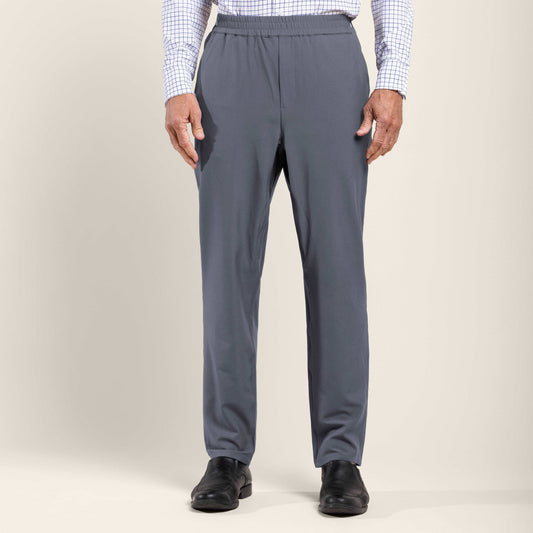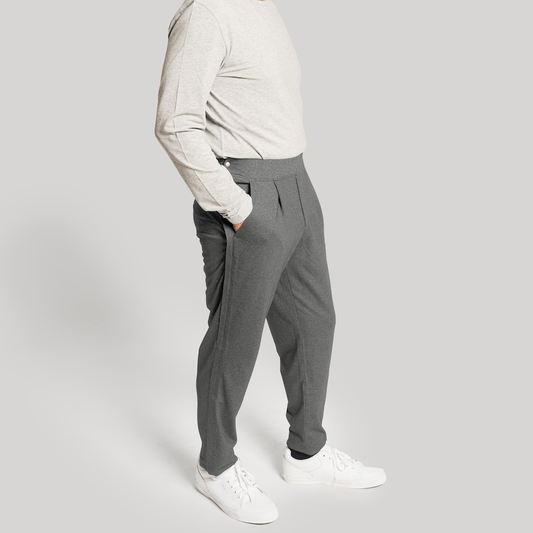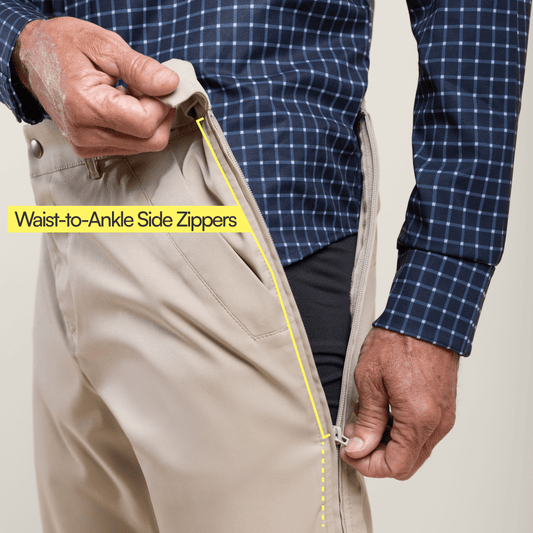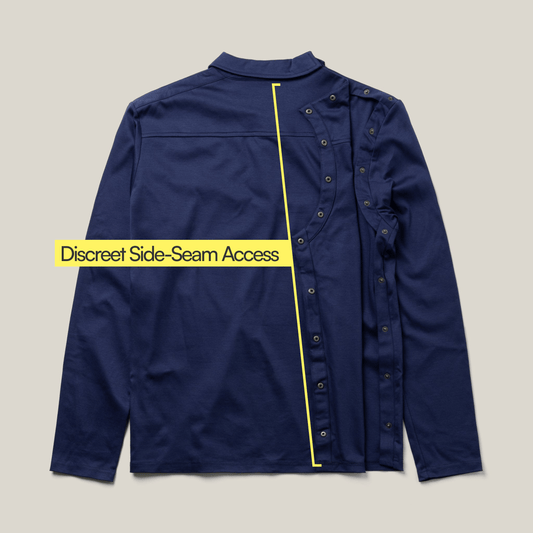Many aspects of daily care are challenging when it comes to helping a loved one who is living with dementia or Alzheimer’s. We spoke with Hadi Finerty, the Senior Manager of Education & Community Volunteers at Alzheimer's Association Illinois Chapter, who gave us some practical tips for Alzheimer's caregivers around some common challenges caregivers face when helping their loved ones get dressed and undressed.
Note: Joe & Bella is a proud partner of the Alzheimer’s Association. In June, we’re donating a portion of all sales to the Alzheimer’s Association’s charity drive, The Longest Day. To learn more about the Longest Day, you can read an interview we conducted with Kim Brey, the Illinois Chapter's Longest Day Manager at The Alzheimer’s Association.
Common Dressing Challenges and Solutions
Closet Overload
- Problem: A full closet gives way too many options! Many adults with Alzheimer’s will feel overwhelmed with too many choices and will not only struggle to make a decision, but could become agitated and frustrated, or even try to avoid changing clothes completely.
- Solution:
- Early Stage:
- Remove most clothes from closets and drawers. You can leave around 4 clothing options max for them to choose from.
- But make sure all clothing combinations match!
- Mid-to-Late Stage:
- You decide what clothes they wear each day. (You can transition here by having a phase where they have two options instead of four.)
- Lay out their clothes for them, and hand them one clothing item at a time.
- “Four outfits is too many choices for most people with dementia at later stages,” according to Hadi Finerty of The Alzheimer's Association.
Dressing Confusion
- Problem: Your loved one experiences difficulty when they put on their clothes.
- Solution:
- Early Stage:
- Provide direct clear instructions for how they should dress. Provide simple directives and allow them plenty of time to process before saying it again. (For example: “Put your arms in the sleeves. Now put your head through this hole.”
- Feel free to physically help them with each step if they are struggling. But if they seem to be able to complete each task independently, it’s better to allow them to remain as independent as possible.
- Use Adaptive Clothing for independent dressers
- Clothing with minor enhancements can make the dressing process so much easier. For example, here’s a jacket that has magnetic buttons, making it easier to secure. And here’s a wonderful pair of adaptive pants with a three-zipper system to make dressing easier. You can also find Alzheimer's t-shirts for patients who cannot dress themselves without assistance.
- Hadi: “As the disease progresses, sometimes those simple tasks get more difficult. They might want to button the shirt themselves, but struggle using buttons that require fine motor skills.”
- Mid-to-Late Stage
- Provide more hands-on help. Continue to use clear and direct instructions, but increase the amount of assistance you provide.
- Use adaptive clothing for assisted dressers
- Here’s a great pair of pants that have a zipper from the hip to the knee, and magnetic buttons at the ankle. These openings make it much easier to help someone get dressed and undressed. Or try out one of these “open-back” tops that open up like a hospital gown, so your loved one doesn’t have to raise their arms over their head when dressing.
- Hadi: “I love that the pants have magnets. I think that is amazing. You don't have to worry about a zipper fly being down, because that's one more thing they have to worry about.
Fit and Skin Sensitivity
- Problem: Some Alzheimer’s patients get more sensitive to touch, which can impact the kind of clothes they like to wear.
- Solution: Be aware and look for signs that this is occurring. If they get agitated or refuse to change out of clothes, or refuse to put on certain clothes, this could be the issue. If you find out that the clothes are too rough or uncomfortable for their skin, swap it out for something more comfortable.
- Problem: Clothes don’t fit as well as they used to.
- Solution: Bodies are constantly changing, and as a result, the way clothes fit will change too. Again, you need to be hyper aware of any changes and monitor how these changes affect your loved one’s comfort level.
- If they spend most of their days sitting, finding a pair of pants that are specifically tailored to those who sit most of the day will greatly increase their comfort.
- Sometimes those with Alzheimer’s will struggle to communicate that their clothes are too tight or irritating their skin, so it’s up to you to notice if these issues arise. For example, if your loved one is complaining about stomach pain, check first to see if his pants or belt are secured too tightly. Even better, use a pair of pants designed for older adults that ensures the waistband is comfortable and will never get too tight.
- Find clothing that is loose fitting with fabric that won’t irritate sensitive skin.
Aggressive Behavior During Changing
- Problem: Your loved one exhibits aggressive behavior, making it difficult to get them dressed or undressed.
- Solution:
- Firstly, remember that your loved one is suffering from a disease and you should not take anything they say or do personally. Remember that you’re the healthy one and need to remain calm and direct with your communication.
- Understanding which part of the process triggers them might help find the best solution. Are they overwhelmed by having to make too many decisions? Are they frustrated that the process is difficult? Do they not like the clothes? Do they not fully understand your directives?
- If you need to help them when dressing, use adaptive clothing, such as open-back tops, so you are able to stand behind them, instead of in front of them, when getting them dressed. This can reduce the chance that they are able to physically interfere with the dressing process or make unnecessary contact with you.
- Hadi: “Remember to meet the disease where it's at. It's really important to not criticize. patience is a virtue, especially when it comes to repetition.”
- Hadi: “When we communicate, we really have to just make sure to not treat them as kids; we still want to have respect for them.”
Compulsive Undressers
- Problem: Your loved ones habitually takes off their clothes at inappropriate times.
- Solution: For some adults who live with dementia and Alzheimer’s they might develop a socially awkward habit of removing their clothes. If this is the case, you might want to consider “anti-stripping” clothing options that are designed specifically for adults with dementia. You can also get them clothing such as alzheimer's t-shirts or clothing.
- This onesie jumpsuit, for example, has a zipper in the back to keep it secured that the wearer cannot reach. The jumpsuit is comfortable and looks like regular clothing, but will protect the wearer from stripping in public.
Joe & Bella's Adaptive Apparel Collections:
Men's Adaptive Clothing | Women's Adaptive Clothing | Men's Adaptive Shirts | Women’s Adaptive Shirts | Men's Adaptive Pants | Women’s Adaptive Pants | Gripper Socks | Side Zipper Pants | Compression Socks | Best Adaptive Clothing | Adaptive Apparel

























































